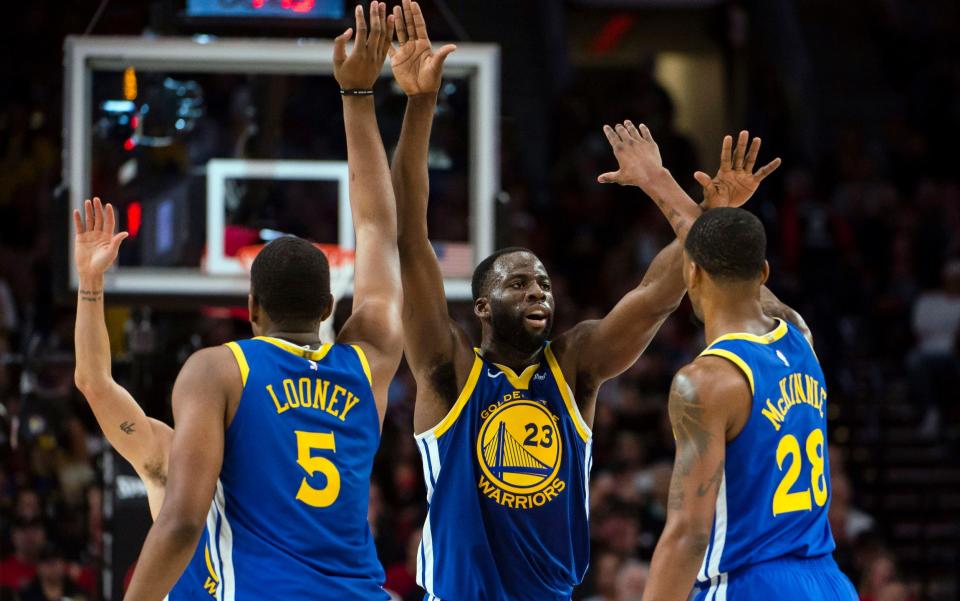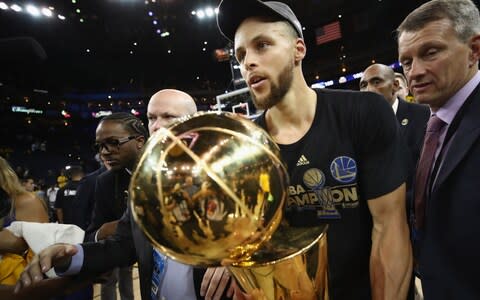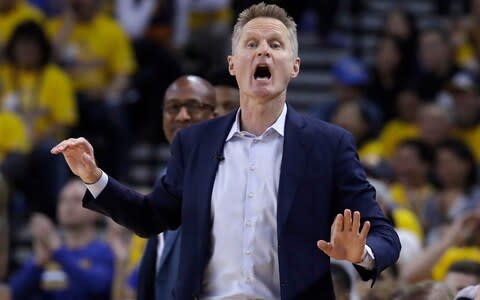How the Golden State Warriors built a dynasty in a sport designed to prevent them

To understand the brilliance of Steph Curry, hailed as the best basketball shooter there has ever been, watch him training before a game.
An hour before each Golden State Warriors match, Curry is on court, being fed basketballs by assistant coach Bruce Fraser to shoot into the hoop.
He starts off taking shots from just a little past the mid-range line. Then he moves into the corner of the court, practising shots that require extraordinary precision to execute - and Curry makes these even harder, taking the shots off-balance, with one leg off the ground, or leaning back, replicating the pressure exerted by an opponent.
Curry is not done until he has taken shots from inside his own half, long past what would be considered futile for virtually any other professional basketball player.
“You find some very unorthodox ways to challenge yourself,” he tells Telegraph Sport. “It's mostly balance work in terms of challenging yourself and making it a little bit harder in your practice than in the game - things click.”
Three-point shooting - shots from outside the arc 7.24m away from the hoop - are transforming basketball. Statistically, Curry is the best there has ever been at shooting three pointers. In the list of players to have scored most in a single season it is his name at positions 1, 3 and 4. He is at the apex of a revolution, a player who has changed the way the his sport game is played.
“I guess I also have a certain natural-born skill for it and was blessed with that talent. In terms of trying to sustain it and shoot at a high level it's about practising the shots I'll take in games and repeating that motion over and over and over again. No matter how well I shoot, I feel like I can get better.”
There is a sense that the game Curry and Golden State are playing - with its combination of three-point shots and interchangeable player movement, which has been termed positionless basketball, evoking total football - is the sport of the future.
“We're pushing it all up,” Curry says. “People say I'm ruining the game but I feel we're just evolving.”
Domination in a league built for parity
Unlike European football leagues, US sport leagues are set up to ensure competitive balance. Salary caps prevent any side from buying all the best talent. Every season, the draft gives the best young players to the weakest teams. The league has essentially legislated against dynasties.
Yet on Thursday night, the Golden State Warriors will play their first game in their fifth straight NBA Championship play-offs. They are the first team in 52 seasons to make five consecutive finals. Curry, and the Warriors, have won three and are heavy favourites to win again against the Toronto Raptors, which would make it three NBA titles in a row. Golden State can claim to be the best domestic side in all of men’s sport today.

The story of the Warriors super team begins with a Silicon Valley takeover. In 2010, an investment group headed by the venture capitalist Joe Lacob bought the team for $450million (£356m), considered one-third more than the franchise’s market value. Lacob’s proclamation that Golden State would win the NBA within five years was mocked, and with good reason. As late as 2012, they were 13th out of 15 in the Western Conference, losing almost two games for every one they won.
But Lacob was presiding over a quiet revolution. Building on the recruitment of Curry as a 21-year-old in 2009, Golden State continually used the draft system astutely. As detailed in Erik Malinowski’s book Betaball, Golden State were pioneers in everything from using motion-capture camera technology, assessing players’ heart-rate variability and monitoring sleep.
In 2014, Lacob hired Steve Kerr to coach Golden State. Ostensibly it was an odd choice: Kerr did not have any professional coaching experience, though he had worked as a general manager. But his curiosity made him ideal for a team trying to be pioneers, on and off the court.
Naturally, a team owned by Silicon Valley were drawn to big data. “We have a lot of information now that we didn’t have 20 years ago, and we have our analytics department - I get a report every single day,” Kerr says. He has found “certain numbers that are very important to us, that seem to translate towards winning,” citing passes per game.

“We found that the more passes we made, the better our offence was, because the more the defence had to work. Twenty years ago you would have had to have a statistician literally watching and counting the passes. Now we have cameras everywhere, and computers, and software that spits out that data in real time.
“The analytics help me make my point with the players. So if there’s something that I see on the floor, and there’s a stat that backs it up, I can use that. And the players seem to enjoy that too - they like math.”
“Everybody is starting to pick up the little nuances outside the court to help you gain an advantage,” explains Kevin Durant, one of the NBA’s best players who may not feature in the finals as he recovers from a calf injury. He was persuaded to join in 2016, after Golden State partnered with a virtual reality company to show him what it would be like to play for the team. “Looking at the data, looking at the bench, seeing sleep doctors and psychologists, and all that stuff that comes in is trying to cater to the players and make the players better. And I think guys have been growing because of it.”
In his own relentless quest for self-improvement, Curry used to wear strobe goggles in training. “It’s just an extra stimulus that could test you and challenge you, take away some of your sensors so that you could really lock in focus. As hard as I could make things in practice, the easier it gets in games.”
Old fashioned man-management
“Everybody matters - every player is going to make an impact,” is how Kerr summarises his philosophy. Kerr personally gives $1,000 bonus to each of the 200 Golden State employees every time they win a title, according to Sports Illustrated. Players are so enamoured with Kerr that several earn less at Golden State than they could command elsewhere.
“You try to develop a style that suits your team’s talent, and you try to do it together - generate an atmosphere where players are excited about coming to work every day,” Kerr says. “Basketball is a game of five players having to play as one. Our star players all complement one another: they all do different things, they make each other better. That’s a rare occurrence when you put all-star players together. Sometimes they overlap and they get in each other’s way, but not our team.”
“He empowers guys to do that stuff, so it’s a great environment” Durant reflects. “The whole front office has done such a great job of putting players in here that they believe that can do multiple things on a basketball court, and coach wants that out here on the floor.”
Kerr’s willingness to look beyond basketball for ways to improve his team illustrates the open mind of a man for whom the journey is never complete.
“I think there’s a lot of similarities between football and basketball,” says Kerr, an avid Liverpool fan. Sometimes, he gathers the team together to watch football highlights.
“A couple years ago we talked about the Barcelona style of play - the tiki-taka - and I was fascinated by ball movement, and the possession of the ball and how much that meant. And I really believe that a big dynamic for us to help us win is winning the possession battle - committing fewer turnovers than our opponent, getting more rebounds, and then sharing the ball.
“Basketball and football are both in many ways games of triangles. You know, you get three players in a triangle, and you pass to one and the other guy cuts, and a give-and-go - trying to gain an advantage over the defence, trying to draw two people to the ball to free up somebody away from the ball - these are all concepts that I see in football that are similar to basketball. And I think that’s one of the reasons a lot of former soccer players end up making great basketball players.”
When the season is done, Kerr hopes to chat with another head coach facing a crunch match. “I would love to meet Jurgen Klopp. I think that would be really interesting.”
Reminding his players of the world that exists outside keeps the players “grounded,” Kerr explains. This is wired into Kerr from personal experience: in 1984 his father, an American academic, was assassinated while working in Beirut. Like many of his team - including Curry, who turned down a White House visit - Kerr has been a vocal critic of Donald Trump. The side resolutely rejects the fallacy that sport and politics don’t mix.
“Just keeping perspective on life is a good tool in coaching. Because this can seem like it’s so important. The way the media and the fans, social media - the criticism, the judgement - it can be suffocating as a player, as a coach. And so just having a discussion about Syrian refugees - just to throw one out there - it’s a reminder to the players how lucky we are. You know, there’s people in their world who are suffering every day, and we get to come out here and play basketball for a living and make a bunch of money, and we’ve got it made. So this job isn’t easy, but relative to how other people in the world have it, it’s a dream.
“There are so many things outside the game that matter a lot more. And so having political discussions occasionally, or giving players an interesting book to read, or finding out what players are doing in their summers and off time - all those things matter. And I think when you get to know your player better you’re able to coach him as well, whereas it’s hard to yell at a player for a mistake if you don’t know him very well. But if a player knows that I love him and I am just trying to get the best out of him, he’s much more likely to respond to criticism or teaching, and so I think trying to connect with players is really important.”
Such perspective helps the Warriors retain their street spirit - the willingness to take risks, and the exploration of the possibilities of the game.
“We still have a kid-like, a child-like joy when we approach the game,” says Durant. “Obviously we’ve got talent, and a great coach, and a great system, great organisation on the top of that. But the reason why it works is because everybody is selfless, everybody is humble in their approach to the game, but also brings a certain edge.
“We try to push the boundaries, but also stay within the framework of the team. We also realise we’re playing a game, and there’s a strategic part to it, but there’s also a feel, and a natural flow of the game that you want to have - you want to still bring that type of enjoyment that you had as a kid into the NBA. And I see guys doing that. You can tell they‘ve mastered the game.”

